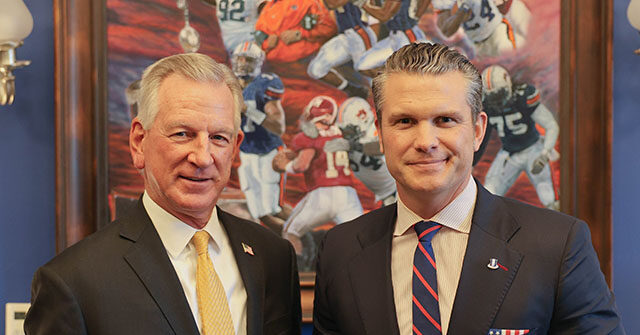Senator Tommy Tuberville (R-AL) recently expressed strong support for Pete Hegseth, President-elect Donald Trump’s nominee for Secretary of Defense, following their meeting in Washington, D.C. Tuberville characterized Hegseth as a “drill sergeant” capable of steering the Pentagon back on course, emphasizing the need for transformational leadership within the military rather than traditional senior officers. In Tuberville’s view, Hegseth possesses the requisite understanding of military needs and culture to reinvigorate the armed forces by prioritizing combat readiness over bureaucratic interests. Their conversation lasted approximately 40 minutes and served as part of Hegseth’s preparation for upcoming confirmation hearings.
The senator elaborated on Hegseth’s attributes, citing his extensive experience, having served in the military for two decades and actively participated in combat operations. Tuberville noted Hegseth’s capability to connect with younger service members, which is essential given the military’s recruitment challenges in recent years. In conjunction with this perspective, Tuberville indicated that the armed services need a leader who prioritizes the personnel actually engaged in combat over those who are more concerned with administrative issues. This sentiment demonstrates Tuberville’s belief that Hegseth’s appointment could lead to vital adjustments in how the military operates.
A pivotal point of Tuberville’s commentary addressed recent difficulties in military recruitment, attributing them to a perceived “woke” culture within the armed forces. He criticized the military’s diversion from its primary mission to engage in social experiments that may deter potential recruits who are looking for a more traditional military experience. Tuberville argued that young people are disinclined to join a military that they perceive as lacking respect for historical values, further asserting that these cultural shifts negatively impact recruitment. By promoting Hegseth as a nominee, he implies a stark rejection of current trends in military culture.
Despite the criticisms leveled at Hegseth by mainstream media outlets, Tuberville defended him, asserting there will be no legitimate basis for concern in the scrutiny surrounding Hegseth’s nomination. He highlighted the importance of Hegseth making the necessary pitches to secure the support of at least a majority of senators to facilitate his confirmation. Tuberville remained optimistic about Hegseth’s prospects, stating that he has ample time to address the challenges he may face from critics. This assertion reinforces Tuberville’s belief in Hegseth’s ability to overcome adversity in the path toward his confirmation as Secretary of Defense.
In addition to expressing support for Hegseth, Tuberville applauded other Trump nominations, including Kash Patel for the FBI and former Rep. Tulsi Gabbard for Director of National Intelligence. He articulated that these appointments, alongside Hegseth’s, are crucial for redirecting the nation’s focus towards pressing issues that demand immediate attention. Tuberville’s comments suggest that he believes assembling a proactive and aligned leadership team will help address systemic challenges within the government and military infrastructures.
Overall, Tuberville’s approval of Hegseth’s nomination reflects a broader aim of recalibrating U.S. military priorities and fostering a renewed focus on essential combat readiness. The senator advocates for instilling a culture within the military that aligns with traditional American values and enhances efficacy in recruitment and operational capability. By positioning Hegseth as a transformational figure, Tuberville implies a vision for the Pentagon that prioritizes strategy, discipline, and a return to the military’s foundational principles. This narrative builds a case for Hegseth as a potential catalyst for positive change within a military landscape that Tuberville views as in need of significant reform.

